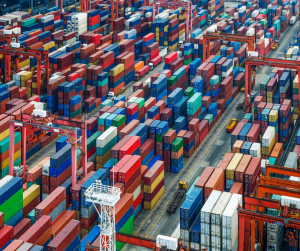Our team continues to work with partners to manage shipments, providing creative solutions during this time. Here are the latest port congestion updates.
U.S. consumer demand continues to drive record import volumes as a much-heralded shift in spending from goods to services has failed to materialize. Data show U.S. retail sales in January increased 4.9% year over year, while retail inventories in December, the latest available data, rose 3.7% year over year, according to data provider Trading Economics.

East Coast ports: Many shippers shifted imports to East Coast ports recently due to continued West Coast port congestion. This is creating new congestion challenges. Some carriers made unplanned cuts to East Coast port rotations in late March (the latest data available) due to this congestion.
European imports: Further impacting congestion, U.S. imports from North Europe in February grew 11.4% year over year to 141,482 TEU in February after rising 9% for the full year in 2021, according to data from PIERS, a sister company of JOC.com within IHS Markit.
LA/Long Beach ports: As of March 29, the ship backlog in Southern California was below 50, but marine terminals tell JOC.com they expect the backlog to build again as ships delayed in Southern China due to COVID-19 restrictions join the queue off Los Angeles and Long Beach.
Rail dwell times: West Coast port managers and terminal operators are urging the Class I railroads to immediately boost their deployment of railcars and locomotive power in Los Angeles-Long Beach, Oakland, and Seattle-Tacoma. In mid-April, 16,000 containers awaited rail transport at the Port of LA. Twice the number year over year with officials saying it is due to lack of equipment.
Dwell fees: The ports of Los Angeles and Long Beach continue to delay their “Container Dwell Fee” until April 29. Currently, carriers can be charged a fee for each import container dwelling nine days or more at the terminal. Since the program was announced in late October 2021, the ports have seen a decline in aging cargo of nearly 50%.
If you need support importing or exporting cargo, contact our team.
